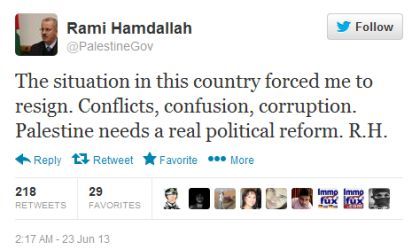 Everything you need to know about today’s coverage of Israel and the Mideast. Join the Israel Daily News Stream on Facebook.
Everything you need to know about today’s coverage of Israel and the Mideast. Join the Israel Daily News Stream on Facebook.
Today’s Top Stories
1. Israel’s receptive to John Kerry’s latest idea for restarting peace talks. It’s not clear if the PA’s on board. The Jerusalem Post lays out Kerry’s formula:
Prime Minister Binyamin Netanyahu is willing to release prisoners jailed prior to the Oslo Accords and officially freeze settlement construction outside of the main blocs in order to help restart the peace process, Hebrew daily Ma’ariv reported on Tuesday, quoting Western diplomats.
In return, Palestinian Authority President Mahmoud Abbas will give up his main precondition to start talks based on the 1967 lines, the Western diplomats are quoted as saying.
For contrast, see far bleaker Washington Post coverage.
2. Qatar’s emir, Sheikh Hamad bin Khalifa Al-Thani, is handing over rulership to his 33 year-old son. In the Arab Spring context, AP explains why it matters:
The transition to the 33-year-old crown prince, Sheik Tamim bin Hamad Al Thani, appears a direct response to the Arab Spring demands for reforms and its emphasis on giving a stronger political voice to the region’s youth.
It also upends the ruling hierarchy among neighboring Gulf allies dominated by old guard leaders such as the 90-year-old King Abdullah in Saudi Arabia and Kuwait’s 84-year-old emir, Sheik Sabah Al Ahmed Al Sabah.
The emir secretly visited Israel in 2010; he made a higher profile visit to Gaza last October.
3. Israel HaYom updates the latest sanctions from striking Ministry of Foreign Affairs employees. This is what we’ve come to:
As part of the service suspension, Foreign Ministry employees in Israel and overseas will no longer issue new or replacement passports, or visas of any kind. The ministry’s Apostille notarization service, which provides international certification for legal documents such as birth and death certificates, has been suspended as well.
Israeli tourists who find themselves stranded abroad are advised to turn to a local Chabad house for assistance, Army Radio said.
See also the Jerusalem Post, which picks up on Georgian Prime Minister Bidzina Ivanishvili’s visit amid sanctions. (The Georgian Times didn’t notice anything amiss.)
4. Are You the Watchdog of the Week? If you’ve achieved a success in Israel’s fight against media bias, you could be named our Watchdog of the Week.
5. No wonder Israel’s perceived as the aggressor in Gaza. Indie Ignores Rockets . . . Unless Israel Fires Back
Israel and the Palestinians
• Credit Richard Symons with a nice look at the investigation into Yasser Arafat’s death. Published in The Independent, Symons raised a lot of hard questions:
While Mr Shaath is unequivocal now, the day after Arafat’s death he reportedly spoke to Arafat’s doctors and was told they had “ruled out poison completely”. So why has his story changed? Arafat’s nephew and Palestinian envoy to the UN, Nasser al Qidwa, claims it is a question of politics. “From the very beginning there was a theory going around that this was poisoning,” he says. “[The French] didn’t lie, but of course they didn’t feel they were in a position to take the political responsibility by giving the necessary proof.”
The political calculation cut both ways. “Proof [of poisoning] would have meant the end of the peace process,” Mr Al Qidwa says. Mr Shaath agrees. “I think it was a matter of choice. We didn’t push for an autopsy.”
• With the dust settling on Rami Hamdallah’s 18-day government, who the heck might be interested in being the PA prime minister?
A senior Palestinian official told Israel Hayom on Sunday that Abbas would like to name Mohammed Shatiye, a prominent member of the Fatah Central Committee, as Hamdallah’s successor. The official stressed that Shatiye had not been offered the job, but he had been approached.
• Israeli diplomat Uri Resnick took to the LA Times op-ed pages to debunk the idea that Israelis aren’t philanthropic.
• Two questions on the BDS movement:
- When has the BDS movement ever addressed the other countries in Jake Lynch‘s silly Venn diagram analogy?
- Has Queers Against Israeli Apartheid, heard about Russia?
• Worth reading: Celebrities Should Visit, Not Boycott Israel, argues syndicated columnist Deroy Murdock.
- A visit to the world’s largest fortified underground hospital — located in Haifa.
- Jon Stewart “plays the Jewish card” on Egyptian TV.
- Canada: Iran has 2-3 months to prove willingness to resolve the nuclear crisis.



